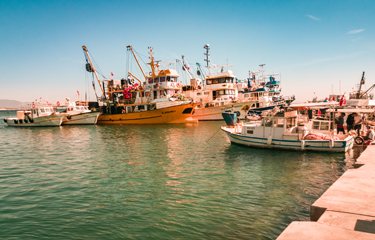The coronavirus pandemic has had major effects on the production and sales of wild-caught and farmed seafood in the Mediterranean and the Black Sea region, according to preliminary analysis from the Food and Agriculture Organization of the United Nations’ (FAO) General Fisheries Commission for the Mediterranean (GFCM).
While the extent of the impacts and the measures taken across the region have varied from country to country and are constantly evolving, GFCM found that in fisheries, the immediate response was a general decrease in production – with volumes down 75 percent in most of the countries. Meanwhile, with no restaurant trade and few export routes remaining open, the overall aquaculture harvest decreased.
In capture fisheries, the number of operating vessels has reduced by as much as 80 percent. Small-scale coastal vessels have been the hardest hit with less than 10 percent still operating in some cases. The analysis also learned that social-distancing restrictions have been the hardest to comply with, especially in fisheries involving small vessels.
For aquaculture farms, the level of activity has varied widely across the region, depending on the type of species reared. Finfish farms, which generally require daily distribution of feeds, environmental monitoring, and pathology control, remained active but with a reduction in employee numbers, whereas farms rearing other species requiring less-regular maintenance decreased their activity.
GFCM also found that while aquaculture sales and production decreased in some countries, including 50 to 60 percent sales reductions for Cyprus and Greece, and a 30 percent decrease production in Tunisia, for others like Algeria, Egypt, Lebanon, and Montenegro, production levels have generally remained unchanged. This was due to stable national fish consumption, particularly with regard to tilapia in Egypt and trout in Lebanon, it said.
With regard to the economic impact of the pandemic, the capture fisheries sector has seen ex-vessel prices fall by around 50 percent, while aquaculture farms in European Union countries have generally experienced a 30 to 40 percent decline in revenues.
The changes in fisheries product prices have been principally driven by a drastic decline in demand from the hotel, restaurant, and tourism industry, as well as limited ability to export to international markets, and changes in consumer preferences towards lower-value species and canned products. In terms of actual species, a 90 percent decrease was reported for blue and red shrimp in Spain, alongside a 50 percent reduction for turbot and John Dory in Bulgaria and France respectively, and a 25 percent less for squid in Egypt.
Within the farmed seafood category, revenues from shellfish, sea bass, and sea bream have been particularly affected due to the closure of the restaurant industries. This is the case in France, with a 46 percent decrease in revenue for oysters; in Spain, where earning from mussels have fallen 83 percent; and in Greece, where an estimated EUR 1.8 million (USD 2 million) per week has been lost from sea bream sales.
“While the repercussions for the aquaculture sector are not yet well understood, it appears that liquidity will soon become an issue for many farmers, as they must maintain the fish stock in tanks and cages. Furthermore, should the situation persist and sales not restart, production for 2021 could be affected,” the FAO analysis stated.
GFCM said the impacts on the fisheries and aquaculture sectors mean the “evolution of this crisis” needs to be further monitored and that steps should be taken to support their recovery. Within this, it suggests that to strengthen resilience, special attention will have to be paid to the impacts on the livelihoods of fishers, aquaculture farmers, and fish workers along the value chain.
“Such efforts will necessarily include continuing to promote decent working conditions so that those able to work can do so safely, strengthening the supply chains and avoiding wastage, promoting direct sales and innovative marketing channels, enhancing access to social protection systems to reduce vulnerability and supporting investment in the fisheries and aquaculture sectors,” it said. “Furthermore, there will also be a need to evaluate the effects of reducing fishing pressure on natural resources in order to have an understanding of any potential change to the status of resources. A mix of immediate action and longer-term strategic initiatives is needed to secure and reconcile the economic, social, and environmental sustainability of fisheries and aquaculture sectors in the Mediterranean and the Black Sea. The post-2020 strategy of the GFCM will heed this call.”
Photo courtesy of Ipek Morel/Shutterstock







